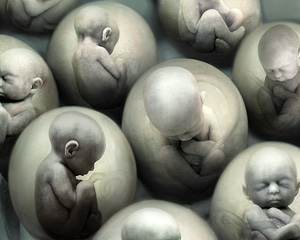Humans destined to practice their own cloning to save mankind from inevitable decline
European governments approve new laws on human cloning
The referendum about the softening of the law regulating the In Vitro Fertilization procedure, which took place in Italy in the middle of June, failed on account of the low turnout. Only 24 percent of Italian citizens came to the polls to express their opinions on the matter, although not less than 50 percent of votes were necessary for the successful outcome of the voting. 
The Vatican, one of the major adversaries to soften the IVF-regulating law, called upon the Catholics of Italy to ignore the referendum. According to the Vatican, current restrictions in the IVF procedure protect the Biblical commandments. As a result, infertile Italian couples will have to seek medical help abroad. Italian doctors are not satisfied with the law either: they are not allowed to use human embryos in scientific purposes; neither can they conduct ultrasonic examinations of the fetus to determine hereditary diseases at early stages.
Leading news agencies of the world reported two rather important news messages in the beginning of the current year, though. One of the news stories originally came from Great Britain. The British government gave permission to Sheep Dolly's creator, Ian Wilmut, to clone human embryos for medical and scientific purposes. The other piece of news arrived from Spain: the Spanish government tends to approve the draft law about the use of human embryos. It is noteworthy that 66 percent of Swiss residents supported the idea to conduct scientific research with the use of stem cells taken from human embryos. The referendum on the subject took place in Switzerland nationwide in November of 2004.
Despite certain nuances in all of the above-mentioned events, it generally goes about the therapeutic, non-reproductive cloning of the human being and the implementation of the project in present-day reality. The research implies the use of stem cells taken from natural or artificially created human embryos. The cells are used for replacing sick cells of the human body or for the artificial growing of separate internal organs as transplants. This type of cloning is viewed as an important step on the way to the reproductive human cloning.
The therapeutic cloning of humans apparently becomes a part of the present era. Common people, scientists and mass media evince more and more interest in the subject. The governments of leading European states approve the laws on the human cloning, reject their previous views and taboos and give green light for the new type of scientific research.
It is noteworthy that the UN General Assembly passed a negative resolution at its session in March of the current year, which prohibited all forms of the human cloning. Over 80 countries, including Russia, upheld the document. However, life and scientific progress dictate their own conditions. The resolution carries the character of recommendation – it does not mean that it must be fulfilled in the countries, which voted for it. It is not ruled out that the human cloning will soon keep pace with the research of the human genome change.
Physical, biological and social conditions of human civilization have undergone drastic changes over the recent 50 or 70 years. Mankind already suffers from the lack of natural resources; humans start paying more attention to quality rather than quantity, which results in the decreasing birth rate. The human civilization has approached the line, when its further existence becomes rather problematic. Humans will probably look for other Earth-like conditions to continue the development of terrestrial civilization. On the other hand, they may change current principles of life as soon as possible. The second variant seems to be more perspective.
Changing the human genome and practicing the human cloning may become a solution in the transformation of standards of life. It goes without saying that the problem needs to be studied thoroughly before it becomes a common thing in present-day life.
Subscribe to Pravda.Ru Telegram channel, Facebook, RSS!





